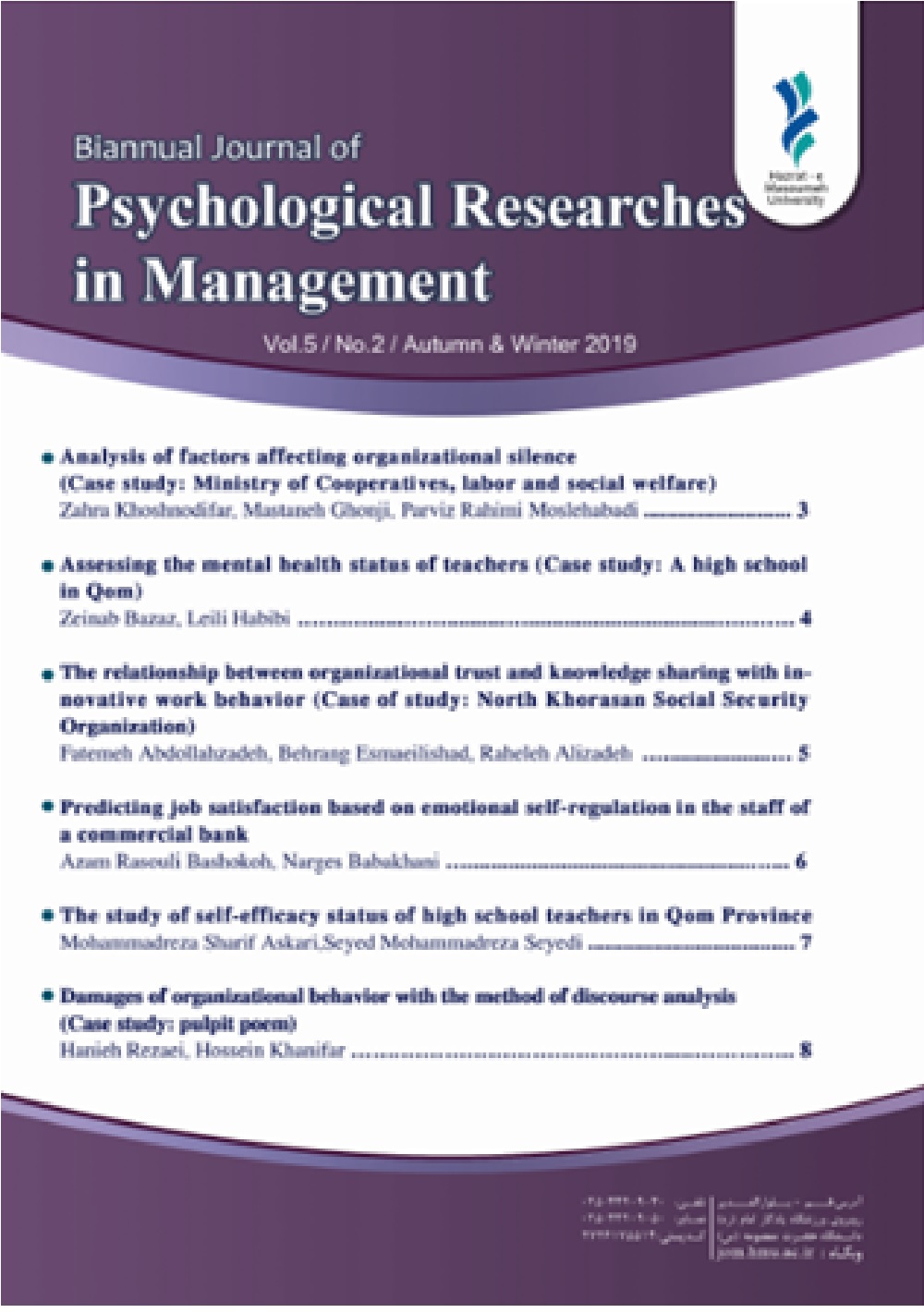Document Type : Original Article
Authors
1 Master of Business Administration, Farabi Campus, University of Tehran, Qom, Iran
2 University Lecturer, PhD in Organizational Behavior Management, University of Tehran ,IRAN
Abstract
Teachers are among the most important social assets of the education system and their mental health is more important than other social classes due to the strategic role it plays in students' mental health.Given the similarity of the goals of the education system and mental health, which both aim to build healthy, useful, efficient and happy human beings, the need for such studies and studies in education is considered important.With the understanding of the above necessity, the present study was conducted to investigate the status and level of mental health of high school teachers in Qom province so that by diagnosing the condition, steps can be taken to improve the level of health and, consequently, teachers' functions and effective training of students.The study population was applied research (descriptive-survey), all teachers and teachers of high schools in Qom province were 2800 people who were selected using random sampling method, a sample of 328 teachers of different educational levels. The instruments used to assess the level of mental health were Goldberg questionnaire and four dimensions and due to the normality of the data, one-sample t-test was used to test the hypotheses.The results show that 95.61% of high school teachers in the province are healthy and only 3.96% have been diagnosed as unhealthy. These results indicate the existence of high mental health among teachers. Meanwhile, similar to most previous studies, female teachers with an average mental health of 20.58 have better mental health than male teachers with an average of 17.47. In general, the results showed that mental health and dimensions of physical symptoms, anxiety and sleep disorders, social dysfunction and depression in high school teachers in Qom province are in good condition.
Keywords
- اصغریپور، شاهد و مسعودی، شاهد (1382). بررسی سلامت روان دانشجویان مجرد و متأهل دانشگاه فردوسی مشهد. پایاننامه کارشناسی، رشته روانشناسی، دانشکده علوم تربیتی و روانشناسی، دانشگاه فردوسی مشهد.
- آگیلاروفایی، ماریا (1397). استرس و شغل معلمی، منابع و پیامدهای استرس شغلی در میان معلمان مقاطع ابتدایی و متوسطه. پژوهشهای روانشناختی، دوره 4؛ شماره 1 و 2، 91-63.
- پالاهنگ، حسن (1374). بررسی همهگیرشناسی اختلالات روانی در شهر کاشان. پایاننامه چاپنشده دوره کارشناسی ارشد. دانشگاه علوم پزشکی
- پور عباد حماملو، عادل (1384). وضعیت سلامت روانی دانش آموزان و ارتباط آن با خودکار آمدی و پیشرفت تحصیلی، http://tabriz3edu.blogfa.com/post-24.aspx.
- تقی پور ظهیر، علی (1376). مبانی و اصول آموزشوپرورش، تهران: انتشارات آگاه.
- جمعی از نویسندگان ادارهی کل تغذیه و بهداشت مدارس (1369). راهنمای بهداشت در مدارس. تهران: انتشارات تربیت.
- خاقانی زاده، مرتضی؛ سیرتی نیر، مسعود؛ عبدی، فتانه؛ کاویانی و حسین (1385). بررسی سطح سلامت روان در پرستاران شاغل در بیمارستانهای آموزشی وابسته به دانشگاه علوم پزشکی تهران، فصلنامه اصول سلامت روانی، سال 8، شماره 31 و 32، 141-148.
- دهقان پور، غلامرضا (1388). نقش خودکارآمدی در توانمندسازی کارکنان،.http://www.aftab.ir/articles/view/applied_sciences/management/c1
- شاملو، سعید (1381). سلامت روانی. تهران: انتشارات رشد.
- عاشوری، احمد؛ سعدیخانی، اصغر و محمدزاده، علی (1383). بررسی رابطه راهبردهای مقابله با استرس با سلامت روانی در دانشجویان دانشگاه شیراز، مجموعه مقالات دومین سمینار سراسری سلامت روانی دانشجویان، دانشگاه تربیت مدرس، 192-190.
- میرخشتی، فرهاد (1375). رابطه سلامت روانی و میزان رضایت از زندگی زناشویی، پایاننامه کارشناسی ارشد مشاوره، دانشگاه آزاد اسلامی واحد رودهن.
- فونتانا، دیوید (1382). روانشناسی برای معلمان. ترجمه: فروغان، م. چاپ اول. تهران. ارجمند. آگه.
- میلانی فر، بهروز (1382). سلامت روانی. تهران: نشر قوس.
- هنرپروران، نازنین (1386). مبانی سلامت روانی. تهران: انتشارات بشری.
- هومن، علی (1376). استانداردسازی و هنجاریابی پرسشنامه سلامت عمومی (28 ـ GHQ) بر روی دانشجویان دوره کارشناسی دانشگاه تربیتمعلم، مؤسسه تحقیقات تربیتی دانشگاه تربیتمعلم.
- یعقوبی، نورالله (1374). بررسی همهگیرشناسی اختلالات روانی در مناطق شهری و روستایی صومعهسرا. پایاننامه چاپنشده کارشناسی ارشد. دانشگاه علوم پزشکی ایران.
- Appelbaum, Steven H. Hongger, Karen. (1998)."Empowerment: a contrasting overview of organizations in general and nursing in parti- cular –an examination of organizational factors, managerial behaviors, job design, and structural power". Joural of Empowerment in organization, 6(2), pp.29-50.
- Bandura, Albert. (1997). Self-efficacy: the exercise of control. New York: W. H.Freeman.
- Best, Ron, Leavey, Gerard & Rothì, M. Despina. (2008). on the front-line: Teachers as active observers of pupils’ mental health, Teaching and Teacher Education, 24, pp. 1217-1231.
- Duckworth, Angela Lee, Steen, Tracy A. & Seligman, Martin E.P. (2005). Positive Psychology In Clinical Practice, Annual Review of Clinical Psychology,1, pp.629-651.
- Hadjistavropoulos, Heather, Dash, Heather, Hadjistavropoulos, Thomas & Sullivan, Terri-Lynn. (2006). Recurrent pain among university students: Contributions of self-efficacy and perfectionism to the pain experience, Personality and Individual Differences, 42, pp. 1081–1091.
- (2000). mental health in the workplace: situation analysis (preliminary report). Geneva: US ILO.
- Kim, Y. H. (2003). Correlation of Mental Health problem with psychological constructs in Adolescents. International Journal of Nursing studies, 40, p. 115-124.
- Kovess-Masfe´ty, Viviane, Rios-Seidel, Carmen & Sevilla-Dedieu, Christine. (2006).Y Teachers’ mental health and teaching levels, Teaching and Teacher Education, pp. 1177–1192.
- McMullen MB. (1999). Characteristics of teachers who talk the DAP talk and walk the DAP walk. J Res Childhood Educ, 13(2), pp. 216-230.
- Pekkanli Egel, Ilknur. (2009). the prospective English language teacher’s reflections of self, Procedia Social and Behavioral Sciences,1, pp.1561–1567.
- Psychological antecedents to individual teacher change. Am Educ Res J, 25(1), pp. 1-30.
- Smylie M. (1988).The enhancement function of staff development: organizational and.
- D & Weize. J. (1998). Perceived personal control & academic achievement, Review of Educational Research, 52, pp.101-137.
- Veijola, J. Jokelainen, J. Laksy, K. Kantojarvi, L. Kokkonen and Jarvelin, M.R. (2002). The Hopkins symptom checklist–25 in screening DSM-III-R Axis–I. Disorder. Nord J. Psychiatry.Well-being, Oxford: Pergamon. PP.27-47
- Whetten, David.A & Cameron, Kim s. (1998). Developing Management skills. New York: Addison – Wesley, Wheelan.
